Learning to Lead
Leaders are often made on the playing field. At Amherst, an athletics department program formalizes this idea by treating varsity sports as a training ground for leaders. Headed by Gregg DiNardo ’01, Amherst LEADS offers the First Year Initiative Program, which teaches new student-athletes about their role on the team and how to lead themselves; the Futures Program, in which sophomores and juniors assess their strengths and weaknesses, study leadership styles and learn communication skills; and the Captains Program, for the student leaders of all 27 varsity teams.
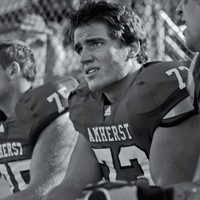
Rob Wasielewski ’14 ➸ Leadership is all about influence
Team: Football
Position: Offensive Lineman
Major: Political Science
On the football field, Wasielewski learned “that leadership is all about influence,” says the tri-captain and three-time member of the All-NESCAC First Team. “Every action, every spoken word, carries with it the power to positively or negatively influence an individual teammate or the team as a whole. Leadership is recognizing this power and using it to better the team.” Also a leader off the field, he was one of two students chosen to serve on the college’s Special Oversight Committee on Sexual Misconduct. From LEADS, Wasielewski has learned to “look inward” and evaluate himself. “I am not sure where I will be next year, but I do know I want to be in a team setting, working alongside others for a common goal. This is the environment I enjoy most and one, I think, that I thrive in.”’
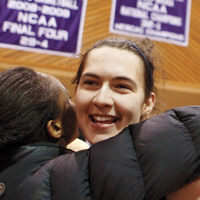
Megan Robertson ’15 ➸ Making the best decisions
Team: Basketball
Position: Forward
Majors: History and Math
Robertson burst onto the scene as the league’s Rookie of the Year in 2011. She’s now one of the leading low-post players in the NESCAC. “Playing college basketball is a very different atmosphere from high school,” she says. “It is important for the leaders on the team to help the newcomers acclimate.” Being on a sports team has helped her learn to collaborate to reach a common goal. A co-captain, she hopes to work in athletics after graduation, perhaps in statistical analysis. “I am currently working with the Amherst LEADS Analytics group to learn more about Division III athletics through statistics. A job in this field would allow me to combine my interests in athletics and math.”

Chloe McKenzie ’14 ➸ Applying your most valuable assets
Team: Soccer
Position: Forward
Majors: German and Law, Jurisprudence and Social Thought
A converted goalie, McKenzie didn’t see the field in her first season at Amherst, yet she realized she could still be a leader, by pumping up her team. “College athletics forces students to recognize how often they must refine themselves in order to improve,” she says. “LEADS helps you investigate what your most valuable assets are as a leader and then encourages you to apply them.” She’s come out of LEADS workshops “knowing myself better. And that is the key to being a good player, to being good at anything.” McKenzie is writing an LJST thesis on rape in the military. In June she’ll join J.P. Morgan as a trader. Longer-term, she wants to be a Constitutional lawyer.
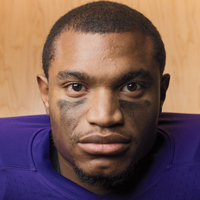
Landrus Lewis ’14E ➸ Responding to adversity
Team: Football
Position: Defensive Back
Major: psychology
Playing football, says Lewis, one of the NESCAC’s premier defensive backs, “I learned how to lead in difficult situations, how to respond to adversity” and how to take into account the goals of the team, not just his personal goals. As a tri-captain, he learned how to “keep a group of people on the same task” and to set a good example on and off the field. Amherst LEADS has helped him understand that he needs to know his teammates as individuals in order to bring them together as a group. “My goal is to become a very successful chiropractor and help people on their journey to better health,” he says. “I would also like to stay involved with football.”
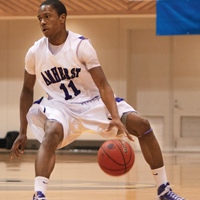
David Kalema ’14 ➸ Finding common ground
Team: Basketball
Position: Guard
Major: Sociology
“When you have a team full of guys from different backgrounds, it’s important to work together to find a common ground,” says Kalema, who was part of last year’s NCAA championship-winning team. “When everyone buys in, practices are better, road trips are more enjoyable, chemistry is built and we find success as a team.” During his freshman year, Kalema’s captains “were so competitive in practice that everyone got better as the team got better.” Playing college sports, he’s discovered there’s no single definition of leadership. “Through Amherst LEADS, I’ve had the opportunity to listen to different speakers from around the country, many of them involved through sports. Through their experiences I’ve learned that anyone can be a leader. Leadership isn’t just about what you say; it’s also about what you do to motivate and push your team, and how you do it.” He hopes to go to business school someday. “I am having a great time writing my thesis on the business of college sports and how it affects student-athletes,” Kalema says, “so I can see myself getting involved in sports on the business side.”
Image
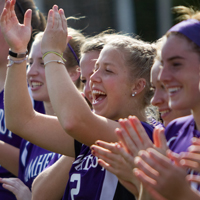

Annika Nygren ’16 ➸ Playing harder for her captains
Team: Field Hockey
Position: Forward/Midfielder
Major: European Studies
“Observing my captains, watching their desire to win and willingness to push themselves to exhaustion to get there, makes me want to play harder for them,” says Nygren. Amherst LEADS has given her the opportunity to hear from guest speakers such as Julius Achon, a former child soldier who went on to represent Uganda in the Olympics. LEADS has also taught her more about herself: “While I have a vocal leadership style on the field, I often find myself in a reserved role in the academic setting. This leaves me room to experiment with participating more often in the classroom and taking the time to listen to quieter teammates on the field.” Nygren hopes to pursue a career as a counselor for children and teens. “Prior to that, I plan to travel the world documenting discoveries in positive psychology and social experiments.”